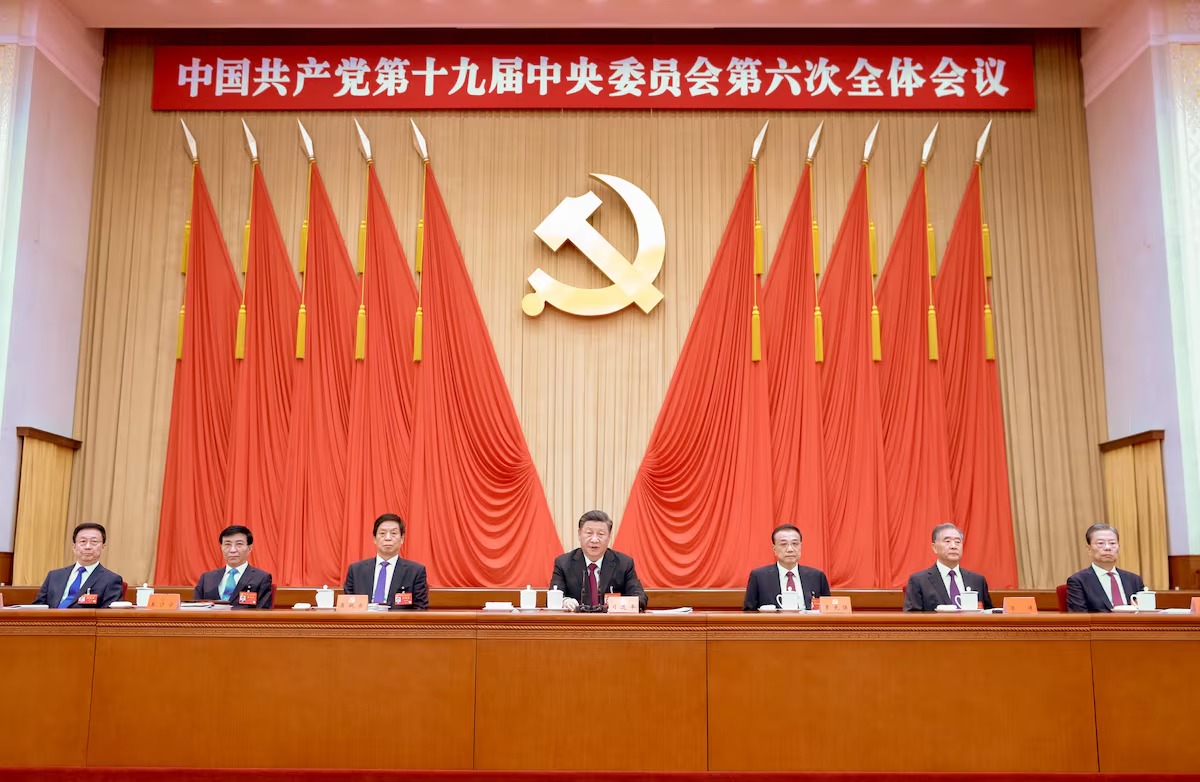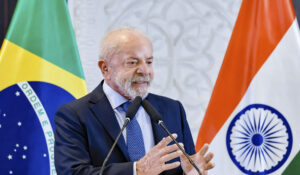
Published 08/04/2025 10:39 | Edited 08/04/2025 12:15
The commercial clash between the United States and China reached a new level this week. After President Donald Trump announces that he intends to impose an additional 50% tariff on Chinese products – if Beijing does not retreat from his retaliatory measures – the Chinese government responded with bluntness.
In an official statement, the China Ministry of Commerce called the climb as “blackmail” and said “fighting to the end” is the only option that the US persists in this way.
China had already announced last week to apply an extra 34% tariff to all US products, in response to the first wave of tariff tariff increases earlier this month.
On Monday (7), the US president doubled the bet and threatened to further expand the rates, causing a record fall in Asian bags and strong retraction in European markets.
For Beijing, giving in to US pressures would be a strategic error. “China will take the necessary measures to firmly protect their rights and legal interests. If the United States ignores the interests of the two countries and the international community and insist on waging tariff and commercial wars, China will surely fight to the end,” said Foreign Ministry spokesman Lin Jian.
Rhetoric was reinforced by article from People’s Dailythe official organ of the Chinese Communist Party, which urged citizens to maintain confidence in the national economy and praised the country’s advancement in areas such as artificial intelligence and renewable energies.
The institutional response also came from the markets. To contain the volatility and restore investors’ trust, the Chinese government has mobilized state -owned companies and the Central Bank to inject liquidity into the system and repurchase shares through public funds.
Central Huijin Investment Ltd., one of the main managers of state capital, announced that it has increased its participation in index funds – wallets that gather shares of the largest companies in the Chinese scholarship, functioning as a market health thermometer. The movement was supported directly by Banco Popular da China, which guaranteed credit for these operations. According to Huijin herself, the intention is to “firmly safeguard the stable operation of the capital market”.
Other state -owned companies, such as China Chengtong Holdings and China Reform Holdings, followed the same way, while the financial system regulatory agency announced the expansion of the investment limit on stocks by insurer funds.
For Wang Qing, Golden Credit rating chief analyst, “the rapid and coordinated action of Chinese state capital will help guide market expectations and mitigate the impact of external shocks.”
Despite the tone, China reinforces that it is open to dialogue – as long as it occurs on equality and mutual respect. Xi Jinping’s government posture, however, leaves no room for unilateral concessions.
According to analysis published in the New York TimesRetreating now would weaken XI’s inner legitimacy and put in checking its strong leadership narrative. “Beijing believes to give in to Trump would not solve the background problem, would only postpone the US offensive against his economy,” says Ryan Hass of Brookings Institution.
According to Yun Sun, director of the China Program at Stimson Center, “total separation between economies may be Trump’s ultimate goal, so China see no advantages in giving up the dispute.
Wang Wen, director of the Chongyang Institute of Financial Studies at Renmin University, says: “If it is a matter of those who handle the most pain, China will not lose. The United States need more from China than China in the United States. Chinese factories make components that do not exist anywhere else in the world. Other countries will buy products from China and resell them to the United States.”
Despite the risk of a global recession, some countries begin to glimpse opportunities. According to review by the Agency Reuters, Brazil may be among the few winners of the trade war.
Unlike traditional US partners, such as European Union, Japan and South Korea – tariff targets up to 20% – Brazil received a 10% symbolic tariff.
In addition, as a liquid importer (term used to describe a country that imports more than exports a particular type of product or service) of US products, the country can expand its exports precisely in the US-losing competitiveness, such as agribusiness.
In Trump’s first management, Brazilian soybean and corn producers benefited from the barriers imposed on US agriculture – a movement that can now be repeated.
The moment has also rekindled expectations regarding the trade agreement between Mercosur and the European Union, for decades in negotiation. According to the agency, Brazil can come out as the main beneficiary, especially if Europeans seek to diversify their markets in the face of instability caused by Washington’s unilateral policies.
US economy is also on the fire line
But the tariff confrontation does not only threaten Chinese growth. Several US companies-especially those operating in the technology sector-are also among the main impaired by the escalation of the conflict. Apple, for example, lost $ 311 billion in market value shortly after the announcement of the first tariffs on April 3. The next day, with Chinese retaliation and new threats from the White House, the company’s actions were still falling.
The iPhone manufacturer, which has over 90% of its concentrated production in China, is among the most exposed multinationals to the conflict. In addition to facing higher costs to import your products to the domestic market, Apple risks seeing its sales plummeting in China – its second largest market. By 2024, the company’s revenue in the Asian country had already shrunk 8%, and analysts foresee a worsening of this trend in the face of growing appeal by national alternatives such as Huawei and Xiaomi.
With rates that reach 60% over the iPhone production chain, the cost of a device can jump from $ 550 to nearly $ 880, according to Banco UBS estimates. The company even tried to secure exemptions with promises of investment in US territory – CEO Tim Cook has announced $ 500 billion in contributions – but so far, Trump’s tariff offensive has not spared the sector.
Other technology giants, such as Alphabet (Google), Meta and Amazon, are also in the sights of possible retaliation. In different parts of the world, antitrust investigations, taxes on digital services and regulatory barriers to US companies grow. According to the magazine report The EconomistUS business partners can adopt the “reverse path” and start attacking the US service sector-precisely what has surplus in the trade balance. By 2024, the US exported $ 1.1 trillion in services, almost double any other country.
The European Union, for example, has already approved a “anti-coercion instrument” that allows you to retaliate unilateral practices with measures ranging from the exclusion of public bidding companies to the blockade of intellectual property rights. For Michael Froman, former US commercial negotiation, the problem is that the Trump government seems more interested in keeping tariffs as a form of coercion than using them as bargaining to open markets.
In addition to companies, the impact of tariffs is already beginning in the pocket of US consumers. In large networks like Walmart and Costco, residents of New Jersey and other states have started a storage movement, fearing high prices and shortages. “I’m buying twice everything – beans, flour, canned products,” Reuters Thomas Jennings, 53, told Reuters. The retired Maggie Collins, with fixed income, exchanged traditional brands for cheaper versions. “Paying more on an item means cutting another,” he lamented.
According to an agency’s apartidal research center, Trump’s tariff can cost $ 3.1 trillion to the US economy over the next ten years – an impact equivalent to $ 2,100 per family only in 2025. Given this scenario, analysts and consumers fear the return of inflation, consumption shrink and the real risk of a recession.
Brazil can benefit from the dispute between powers
Amid the global turmoil caused by the tariff war between the United States and China, some emerging economies envision opportunities. This is the case of Brazil, which was one of the few countries to escape with a milder “reciprocal” tariff of only 10%, imposed by the Donald Trump government. The new round of tariffs comes into force on Wednesday (9), and may represent a competitive advantage for the country in strategic areas such as agribusiness and export of manufactured.
Trump’s tariff offensive especially significant commercial surplus economies, such as China, Japan, South Korea, Vietnam and Bangladesh – all penalized at rates of over 20%, up to 46%. Brazil, on the other hand, is a net importer of US products, which positions it as a lower risk commercial partner in the eyes of the White House. In addition, the country can inherit part of the demand that will be redirected by Chinese companies hit by US tariffs.
The recent history also plays in favor. During Trump’s first term, Brazilian soybean and corn producers profited from the vacuum left by the suspension of Chinese US grains purchases. This scenario can now be repeated with China looking for new suppliers of agricultural commodities, meat and processed foods. Brazil is expected to expand its presence in the Chinese market, while reducing its vulnerability to oscillations in the US.
Other emerging countries are also attentive to breaches that open with the tariff. Egypt, Morocco and Türkiye, all with commercial deficits with the US, see room to advance in sectors such as textiles and steel, as direct competitors – such as Bangladesh and Vietnam – face heavy overflows. “The opportunity is in sight, we just need to grasp it,” said Magdy Tolba, president of the Egyptian-Turka company T&C Garms, Reuters.
In Asia, India bets on redistribution of the global supply chain to expand its slice in the US market, especially in the clothing, shoe and electronics production sectors. It is also expected that part of the manufacture of iPhones, now concentrated in China, to be transferred to the country, due to the new tariffs imposed on Beijing.
Nevertheless, analysts warn that no country will be completely unharmed. In Singapore, for example, the Straits Times index has registered its largest drop since 2008, and the government already admits that a recession in the US or global economy can cancel any immediate benefit. “There are no winners in a trade war,” said Banco OCBC economist Selena Ling. “Everything is relative.”
In South America, in addition to Brazil, the impasse between Washington and Beijing is expected to resume negotiations around the trade agreement between Mercosur and the European Union. With its exports still strongly concentrated in commodities, Brazil could become the biggest beneficiary of a possible advance in the treaty, gaining easy access to the European market at a time of reconfiguration of global commerce routes.
Although opportunities exist, experts warn that gains will be limited by the impacts of a global recession. Instability in capital flows, exchange rate volatility and retraction in demand for industrial goods can curb any more consistent impulse. Still, in the face of chaos, countries like Brazil continue to look for breaches to expand their presence in global markets – even in times of war.
Source: vermelho.org.br

